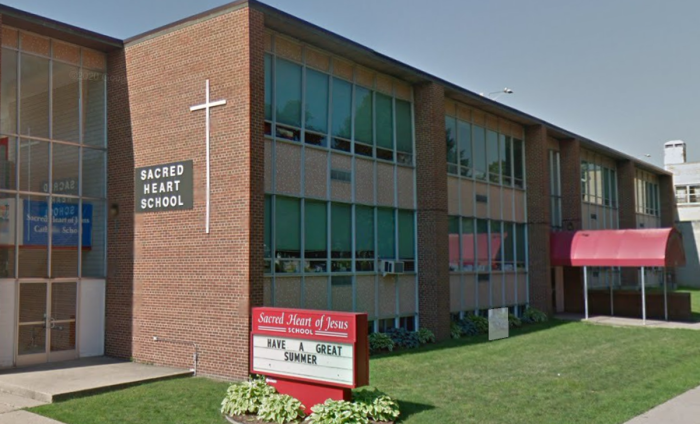Jewish, Muslim groups back religious protections as Catholic school challenges LGBT law

Jewish and Muslim interest groups have stressed the importance of religious freedom protections amid a Catholic school's legal fight for a religious exemption to a state law banning discrimination based on sexual orientation and gender identity.
In a legal brief filed last week, the Jewish Coalition for Religious Liberty and the Religious Freedom Institute's Islamic Religious Freedom Action Team expressed support for the idea of "the coreligionist exemption and its protection of the right of religious groups to make religiously-informed decisions regarding which roles and activities within the organization should be limited to coreligionists."
The friend-of-the-court brief was filed in the 6th U.S. Circuit Court of Appeals on Nov. 20 in the case of Sacred Heart of Jesus Parish in Grand Rapids, Michigan, which is suing the state's Democrat Attorney General Dana Nessel and Michigan Department of Civil Rights Executive Director John Johnson.
The lawsuit follows an amendment enacted this year to the Michigan Civil Rights Act to prohibit discrimination based on sexual orientation and gender identity. The school argues that the amended law could require religious schools to enforce views of sexual orientation and gender identity that conflict with their beliefs and hire staff members who violate the tenets of the Catholic faith.
The two organizations stress that they take "no position on which party should prevail in this specific appeal." However, they filed the brief to "aid the Court's understanding of the coreligionist exemption and to explain the deleterious effect that a limitation or revocation of that right would have on religious groups in general and minority groups in particular."
"The coreligionist exemption allows religious organizations to determine that certain positions, including non-ministerial ones, are so imbued with religious significance that those positions should be occupied only by employees who assent and adhere to certain religious tenets," the brief, submitted by attorney Miles Coleman of Nelson Mullins Riley & Scarborough LLP, argues.
"The coreligionist exemption is a critical precedent that allows religious groups to continue their existence and their purpose by guaranteeing their right to associate, through employment, with those who share the faith of the religious group and exemplify that faith by the way they live."
The brief warned that the Bona Fide Occupation Qualification Process that Michigan has set up to consider exemptions to the law "entangles the state in evaluating, reviewing, and deciding the validity, sincerity, reasonableness, and religious necessity of decisions made by religious groups regarding the religious nature and role of specific responsibilities."
"The alternative proffered by the defendants in this appeal — a discretionary exemption scheme that starts with a burdensome application process and ends by hoping that a bureaucrat will deign to dole out an exemption — does not alleviate amici's concerns. Rather, it exacerbates them, raises significant entanglement concerns, and shows that the state regime is not a neutral and generally applicable law."
The Catholic church, along with parents who send their children to the parish-run school, have asked the appellate court to weigh in after a lower court dismissed the lawsuit.
In her ruling, Judge Jane M. Beckering, a Biden appointee, ruled that state laws "recognize religious freedoms like those asserted by Plaintiffs."
"Even assuming arguendo that either of these acts 'might' be applied against Sacred Heart's intended conduct in the future, Plaintiffs have failed to supply some indication of imminent enforcement, and mere allegations of a 'subjective chill' are alone insufficient to establish an injury-in-fact for standing purposes," Beckering stated.
The opening brief filed by the plaintiffs before the 6th Circuit two weeks ago argues that the changes to Michigan's non-discrimination law will have an adverse impact on the plaintiffs.
The opening brief states that changes to state law make it "illegal for Sacred Heart to hire and retain only faculty and staff who support, live and model the Catholic faith and its doctrines." This leads to concerns that "Sacred Heart cannot hire only those employees who agree with Catholic teaching on marriage, sexuality, and gender identity" while facing pressure to "hire and retain those who advocate a vision of human flourishing that is antithetical to Church doctrine."
Asserting that state law now "prohibits discrimination based on sexual orientation and gender identity in student admission, retention, and discipline," the document suggested that "Sacred Heart can't secure student agreement to abide by the Church's teachings on sexual orientation and gender identity" and will lose the ability to take "disciplinary action against students who violate the Church's doctrine on these matters."
The school's brief, filed by the Alliance Defending Freedom, argues that the law could require the Catholic school to refer to students based on their stated gender identity as opposed to their biological sex and forbid it from posting a statement summarizing its beliefs on sexual orientation and gender identity on its website.
"Michigan is forcing Sacred Heart to make an unconstitutional and unconscionable choice between teaching and practicing the Catholic faith or closing their doors forever, while denying parents of the right to direct the upbringing and education of their children," Alliance Defending Freedom Senior Counsel and Vice President of Appellate Advocacy John Bursch said in a statement.
"Sacred Heart of Jesus Parish has faithfully served Grand Rapids families for more than a century, and its school provides a rich academic and spiritual environment for hundreds of children," he added. "We and the groups that have filed briefs in support of our clients are urging the 6th Circuit to allow their lawsuit to continue so they can take steps toward serving their community without fear of government punishment."
Another amicus brief was filed for the Billy Graham Evangelistic Association, Samaritan's Purse, Concerned Women for America, The Family Foundation, Illinois Family Institute, International Conference of Evangelical Chaplain Endorsers, Pacific Justice Institute and the National Legal Foundation.
Ryan Foley is a reporter for The Christian Post. He can be reached at: [email protected]




























